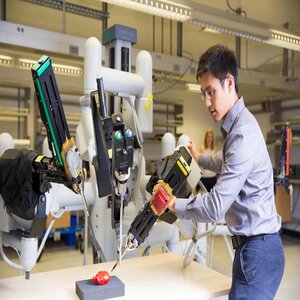What is Robotics Engineering? Scope and Career Opportunities
 Robotics Engineering is an engineering domain that deals with the creation, development and implementations of robots and computers, as well as their handling and processing. As a career choice, robotic science has a wide reach because robots play an important role in the industrial sector. They help to speed up the development process and find enormous applications in the fields of nuclear research, sea exploration, bio-medical equipment design, and many more. All aspects of building a robot, such as robot design, repair, testing, and proper functioning, are taken care of by a robotics engineer.
Robotics Engineering is an engineering domain that deals with the creation, development and implementations of robots and computers, as well as their handling and processing. As a career choice, robotic science has a wide reach because robots play an important role in the industrial sector. They help to speed up the development process and find enormous applications in the fields of nuclear research, sea exploration, bio-medical equipment design, and many more. All aspects of building a robot, such as robot design, repair, testing, and proper functioning, are taken care of by a robotics engineer.
These specialists are also responsible for the production and testing of automated machines to ensure that they are safe to operate and economical to buy. To build and test robotic systems, they use Computer-Aided Design, Computer-Aided Manufacturing (CADD/CAM) and drafting. A Robotics Engineer's other duty is to create a comprehensive framework between people and machines and to use the device for the assembly line of production.
Scope for Robotic Engineers in India
Robotics engineers will develop and build robotics systems for both governments and private sectors. In global engineering firms, engineers may also opt for jobs as technicians. Robotics Engineers with automation experience may also become scientists where they can use various use cases to develop the robotics network and invent some automated software improvement requirements as well.
Eligibility to be a Robotic Engineer
In the science stream of subjects, including physics, chemistry and mathematics, the qualifying requirements for a B.Tech degree in Robotic Engineering is to complete the class 12th. The student must have a Bachelor's degree in each of these engineering streams in order to qualify for a post-graduate degree in Robotics, namely mechanical, electrical, electronics, instrumentation and control, electrical and electronics engineering, and many more.
At both the Undergraduate (UG) and Post Graduate (PG) levels, some colleges and universities may conduct a common entrance test before offering candidates admission. JEE Main and JEE Advanced are the most significant and preferred engineering entrance exams in India. After the B.Tech/B. E has been completed. If a student plans to study further and do postgraduate studies in robotics, he will opt for a Master of Technology (M.Tech) or Master of Technology (M.E.) degree if he graduates with a specialization in robotics. With a specialization in either Robotics Engineering or Automation & Robotics or Remote Sensing & Wireless Sensor Networks, he/she can opt for these degrees. For this, a graduate student must clear the Graduate Aptitude Test in Engineering (GATE) exam.
Courses in Robotic Engineering
In this area, students can undertake diplomas, bachelors and master's courses, a student have to take a degree course in this area to become a Robotics Engineer. Following are some of the courses listed –
1. Diploma in Robotics
2. B. Tech in Robotics Engineering
3. Bachelor of Engineering in Robotics
4. M. Tech in Robotics Engineering
5. M. Tech in Automation and Robotics
6. Master of Engineering in Robotics
Career Opportunities in Robotic Engineering
After completing their degree, the students can take up the following job profiles. Such as Robotics Programmer, Robotics System Engineer, Robot Design Engineer, Automated Product Design Engineer, Robotics Test Engineer, Robotics Device Engineers, Aerospace Robotics Engineers and Quality Assurance Technicians.
Top Recruiters for Robotics Engineers
Indian Space Research Organisation (ISRO)
Bharat Heavy Electricals Limited (BHEL)
Bhabha Atomic Research Centre (BARC)
Precision Automation & Robotics India Ltd.
Defence Research and Development Organization (DRDO)
Indian Institute of Technology (IIT)

